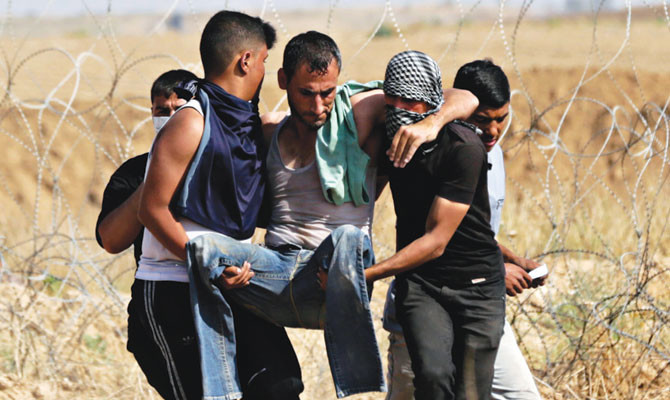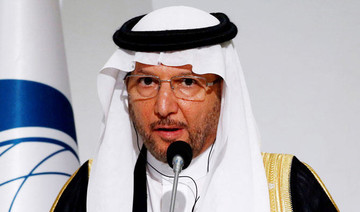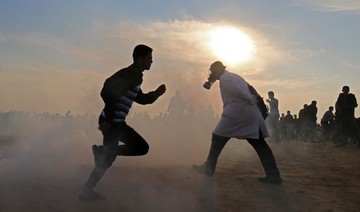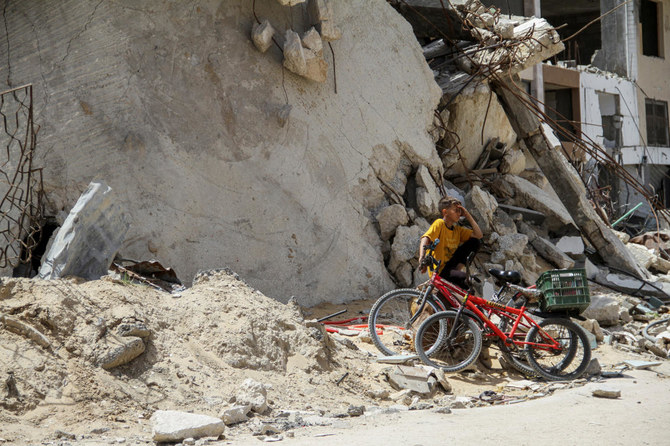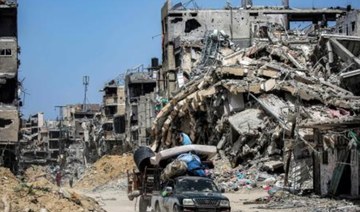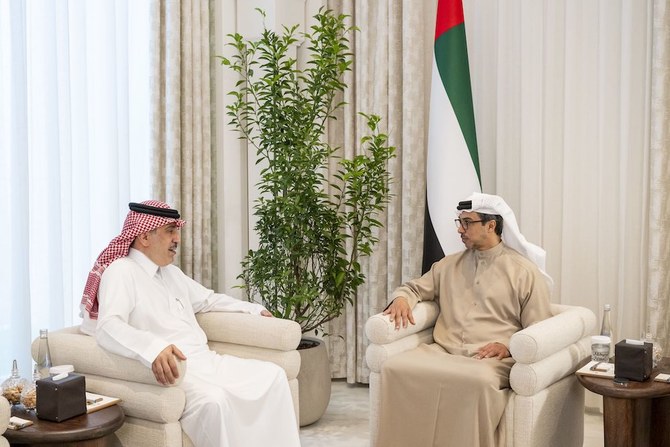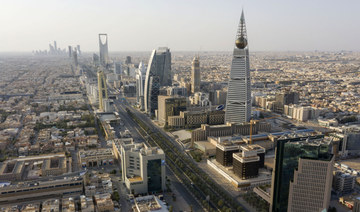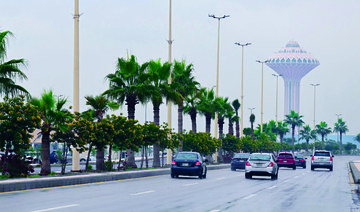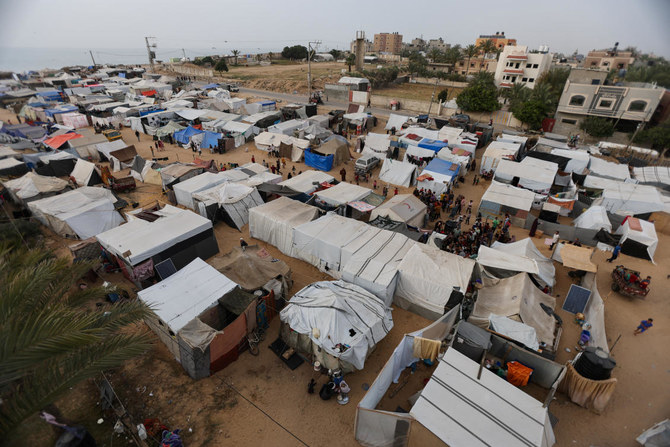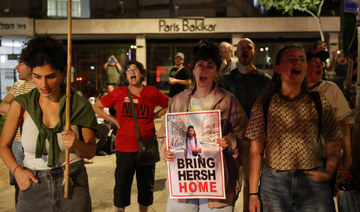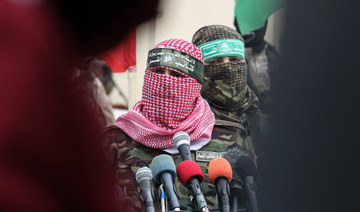GAZA CITY: For eight months in a row, tens of thousands of Palestinians have been taking part in weekly protests along the Gaza Strip’s border with Israel and sustaining serious injuries in lopsided confrontations with Israeli army soldiers. Doctors Without Borders now says the extremely large number of people in need of treatment for bullet wounds has overwhelmed the territory’s healthcare system.
The international humanitarian organization said this week that most of the 3,000 people it has treated since March were shot in the legs, with about a quarter suffering from infections that, if left untreated, could lead to lifelong disabilities or limb amputations.
For 28-year-old Mohammed Yassin, the casualties are not mere numbers. As someone who was shot in the arm while taking part in protests in eastern Gaza’s Al-Zaytoun, a neighbourhood adjoining the security fence separating the Hamas- ruled territory from Israel, he stands to bene t personally if medical-aid groups tend to those local hospitals cannot adequately treat.
On a recent morning, Yassin stood in a queue outside a medical centre in Gaza operated by an international humanitarian organization waiting for his turn to consult doctors. He said he feared his arm may have to be amputated due to the lack of specialised treatment in the territory, which has been continuously under an Israeli blockade since 2007 when Hamas seized control after a violent power struggle with Fatah.
The Great March of Return movement, as the weekly protests are called, was born when tens of thousands of Palestinians in Gaza began confronting Israeli soldiers on March 30, called Land Day by Palestinians, which coincided with the annual commemoration of the founding of the state of Israel.
Since that day, Palestinians from across the social spectrum, living in poverty and isolation in the besieged coastal enclave, have been marching after prayers every Friday towards the heavily fortied border, braving the Israeli army’s live rounds, rubber-coated metal bullets and tear-gas salvos. Along the way, women and children started joining the young men, who are often armed with slings and stones.
Israel has responded with an iron fist, but the confrontations have continued unabated. In November, Benjamin Netanyahu, the Israeli prime minister, agreed to a transfer of Qatari cash totalling $15 million into Gaza as part of a deal apparently aimed at persuading Hamas to end the protests in exchange for Israel easing its blockade.
The Hamas-run health ministry in Gaza has given warning time and again of its inability to cope with the high number of casualties owing to a shortage of medicine and supplies.
The latest figures provided by the ministry put the total number of Palestinian deaths since March 30 at more than 200, including 37 children, and the number of wounded at 22,267. Of the latter, 46.3 percent have suffered injuries caused by live rounds red by Israel.
Yassin, the man with the injured arm, says his condition could improve with treatment abroad, but he is unable to travel through the Rafah crossing, the only connection for Gaza’s two million inhabitants to the outside world via Egypt. He told Arab News he rejected an opportunity for amputation at the local facility of the international organization where he is currently being treated.
Looking to the future, Yassin hopes to save his injured arm, take care of his family and live a full life. But that will take a great deal of effort and determination given that he has lost his job, which earned him about 30 shekels ($8) a day and was enabling him and his wife to raise a family of four little children.
Still, Yassin is fortunate compared with hundreds of other young men, one of them being Mohammed Al-Issawi. The 23-year-old has been injured four times in course of the border protests: shot in various places on his body - once in the leg while taking part in protests east of Al-Bureij refugee camp, in central Gaza - and struck by a tear-gas canister.
Even so, Al-Issawi, who shares his home with 13 other family members, says he has no regrets about taking part in the protests that have taken such a high toll on his health. “God has not written martyrdom for me yet,” he told Arab News, his words reflecting resilience and resignation in equal measure. Protest movements in Palestine usually start o as spontaneous uprisings but tend to get co-opted by political factions with the passage of time. For what is presumably a mix of self-interest and cost control, the West Bank-based Palestinian Authority, dominated by the secular Fatah, has ruled that the casualties of the Great March clashes will not come under the purview of a body called Institution of the Martyrs and the Wounded, making their families ineligible for monthly cash assistance.
However, other Palestinian factions have not shied away from using financial incentives to ensure wide participation in the protests. For instance, Hamas, Fatah’s Islamist rival, has been giving $500 to the family of each victim of Israeli shooting and $200 to each of the wounded. But Al-Issawi, who is unemployed, dismisses the idea that his participation in the protests is motivated by pecuniary advantage. “I will wait for my treatment to be completed so that I can go back to join my friends at the border until the siege is broken,” he told Arab News.
Al-Issawi’s denial is echoed by Youssef Barakat, who has injuries in his left leg. The 23-year-old Palestinian, who is single and lives with his family of 10, says he has not received any compensation since he suffered a gunshot wound while taking part in the Nakba Day demonstrations of May 14 in an area east of Gaza’s Al-Bureij refugee camp.
“We see no option of getting rid of the siege and the impoverishment,” Barakat says stoically, “other than by continuing to confront the enemy.” But more patients with bullet wounds would spell trouble for Gaza’s authorities when the existing caseload of injuries and trauma is already far larger than its network of hospitals, eld medical units and primary health-carecentres can handle. Suheir Zaqout, ICRC spokesperson in Gaza, told Arab News that although doctors in Gaza try their best to save lives and minimise loss of limbs, the waiting list of people seeking treatment for serious injuries keeps getting longer.
For his part, Munir Al-Bursh, who heads the Gaza health ministry’s pharmacy department, said gunshot injuries caused by Israeli snipers are complicated because of their severity. The snipers have killed about 170 people and wounded thousands more, according to reports. The survivors require a large number of surgeries, which tax the skills of even the best medical specialists in the territory, Al-Bursh told Arab News.
The low-intensity border conflict has left many residents of Gaza stuck between despair and hope. Many dream of leaving Gaza and starting life anew somewhere else. At age 24, Mahmoud Quzat has been left with permanent disability since being struck in his right leg by live rounds during protests in Shajaiya, a neighbourhood east of Gaza City, on August 3. “If I had the money, I would migrate to find a secure and stable place,” he told Arab News.
Anxiety and fear of being condemned to a life of unending tension or being reduced to just a statistic in a struggle that has de ed a lasting solution, that, too, in a region rife with brutal wars and humanitarian crises, has yet to dampen Palestinians’ determination to end the Israeli blockade.
Even as he contemplates a better future that looks elusive to most Gazans, Quzat expresses no remorse about his continued involvement in the weekly protests near the border fence. “What do we have to lose?” he says philosophically. “We have already lost half of our lives to 12 years of siege and division.”





